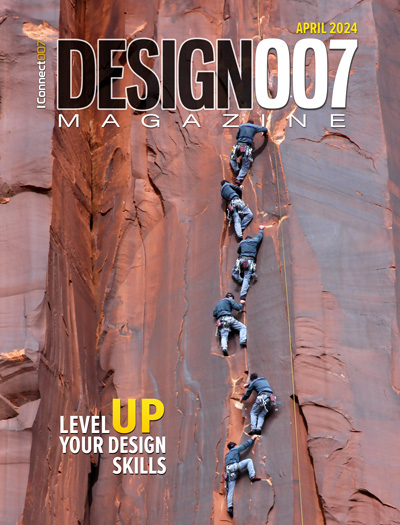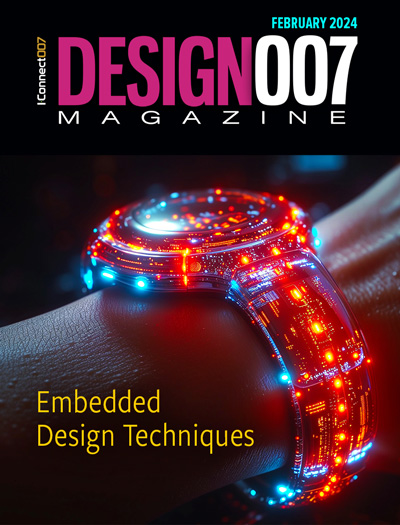-

- News
- Books
Featured Books
- design007 Magazine
Latest Issues
Current Issue
Level Up Your Design Skills
This month, our contributors discuss the PCB design classes available at IPC APEX EXPO 2024. As they explain, these courses cover everything from the basics of design through avoiding over-constraining high-speed boards, and so much more!

Opportunities and Challenges
In this issue, our expert contributors discuss the many opportunities and challenges in the PCB design community, and what can be done to grow the numbers of PCB designers—and design instructors.

Embedded Design Techniques
Our expert contributors provide the knowledge this month that designers need to be aware of to make intelligent, educated decisions about embedded design. Many design and manufacturing hurdles can trip up designers who are new to this technology.
- Articles
- Columns
Search Console
- Links
- Events
||| MENU - design007 Magazine
Altium Invests in Future Designers
April 13, 2022 | Andy Shaughnessy, Design007 MagazineEstimated reading time: 3 minutes
While at IPC APEX EXPO, I stopped by the Altium booth to visit with Rea Callender, vice president of education at Altium. Rea shared information about the company’s recent design competition for students around the world, as well as a new curriculum that is drawing interest from some unique locations.
Andy Shaughnessy: Rea, I know you’ve had a busy week at IPC APEX EXPO. Tell us about it.
Rea Callender: Our company is really interested in supporting the next generation of electronics designers. We feel that it’s our social responsibility to support these young students to move forward and get them ready for their careers by offering them free tools and curriculum that teaches them how to create printed circuit boards.
Shaughnessy: That’s good.
Callender: We want to share our core competencies with these students. We have had several students come through our booth and we’re showing our free curriculum tools called Upverter Education1, which teaches students how to create printed circuit boards from zero to manufacturing if they didn’t know anything about creating a printed circuit board. Once they go through our curriculum, they’d know how to create a printed circuit board. There are also professional tools called Upverter and Upverter Modular that allow them to create the boards and designs.
Recently, Altium partnered with Arduino and IPC Education Foundation to hold #PCBeTheChange 20212, a global student design competition, where you can see the winning boards around the booth. We had almost 90 teams join from both high school and college divisions and their task was to go through our curriculum and use our tools to address some environmental issues locally.
There were three winners in the high school division and three winners from the college division, and because it was a global event, it was really competitive. We had teams from Guatemala, France, Afghanistan, Australia, and Greece, as well as many from the U.S. and Canada. Those who entered addressed a local environmental issue and then created a board using Upverter. The first prize winners received $1,500, with $750 for second place, and $500 for third place.
One of the most notable teams we’ve been working with has been the Afghan Dreamers, which won second place. This is a team that has been on the news. The team is from Afghanistan and had to evacuate. They moved to Qatar. The parent organization of that team is Digital Citizen Fund, which is based in New York. It brings technology to young women in Afghanistan or who are from there.
That’s how we met the Afghan Dreamers. The team members went through our curriculum, learned to use our tools, created a printed circuit board, and won second place. And we actually have a video3. It’s pretty cool.
Shaughnessy: You all are helping make the world a better place.
Callender: Yes, for sure. We also just launched a new educational curriculum called Altium Education3. These are college-level courses that teach college students how to create printed circuit boards. But in this case, it points to our tool called Altium Designer which is our flagship product. Students get the curriculum and a license for free.
We really want to help students get ready for their future careers. Our goal is to attract students to the world of printed circuit boards. Design technology is an art form. We need people from all walks of life to create printed circuit boards and solve the world’s problems. That’s what this is about.
Shaughnessy: This is your way of reaching young people?
Callender: Yes, reaching out to high school and college students.
Shaughnessy: It’s great having them do community service-type of work that’s not necessarily involved with PCB design.
Callender: Right. We challenged them to solve environmental issues. We launched our curriculum for upper education in high schools in September 2020, and we have more than 7,000 students signed up around the world. A huge percentage of students, interestingly, are from India, so I’m really excited about that.
Shaughnessy: Very good. Great talking with you. Thank you so much.
Callender: Thank you, Andy.
References
Download The Printed Circuit Designer’s Guide to… Design for Manufacturing by David Marrakchi. You can also view other titles in our full I-007eBook library here.
Suggested Items
Real Time with... IPC APEX EXPO 2024: Exploring IPC's PCB Design Courses with Kris Moyer
04/18/2024 | Real Time with...IPC APEX EXPOGuest Editor Kelly Dack and IPC instructor Kris Moyer discuss IPC's PCB design training and education offerings. They delve into course topics such as design fundamentals, mil/aero, rigid-flex, RF design, and advanced design concepts. They also highlight material selection for high-speed design, thermal management, and dissipation techniques. The interview wraps up with details about how to access these courses online.
Cadence Unveils Palladium Z3 and Protium X3 Systems
04/18/2024 | Cadence Design SystemsThe Palladium Z3 and Protium X3 systems offer increased capacity, and scale from job sizes of 16 million gates up to 48 billion gates, so the largest SoCs can be tested as a whole rather than just partial models, ensuring proper functionality and performance.
Signal Integrity Expert Donald Telian to Teach 'Signal Integrity, In Practice' Masterclass Globally
04/17/2024 | PRLOGDonald Telian and The EEcosystem announce the global tour of "Signal Integrity, In Practice," a groundbreaking LIVE masterclass designed to equip hardware engineers with essential skills for solving Signal Integrity (SI) challenges in today's fast-paced technological landscape.
On the Line With... Podcast Talks With Cadence Expert on Manufacturing
04/18/2024 | I-Connect007In “PCB 3.0: A New Design Methodology: Manufacturing” Patrick Davis returns to the podcast to talk about design rules. As design considerations become more and more complex, so, too, do the rulesets designers must abide by.
Designing Electronics for High Thermal Loads
04/16/2024 | Akber Roy, Rush PCB Inc.Developing proactive thermal management strategies is important in the early stages of the PCB design cycle to minimize costly redesign iterations. Here, I delve into key aspects of electronic design that hold particular relevance for managing heat in electronic systems. Each of these considerations plays a pivotal role in enhancing the reliability and performance of the overall system.


